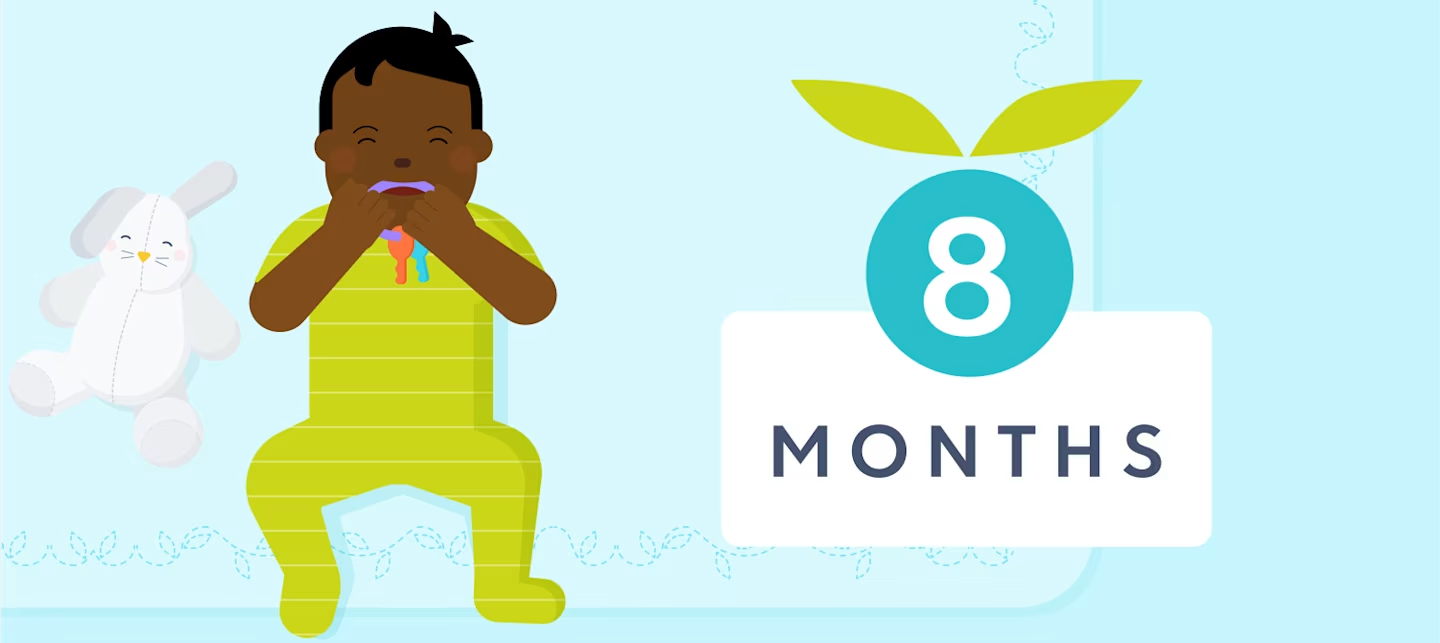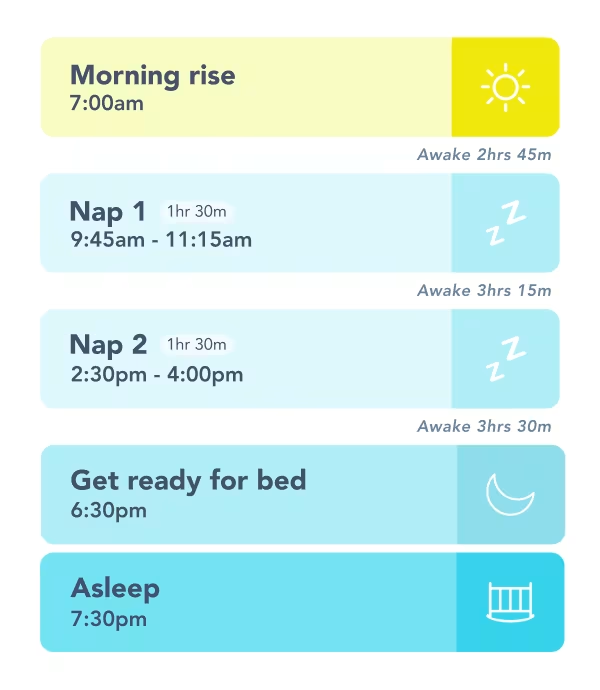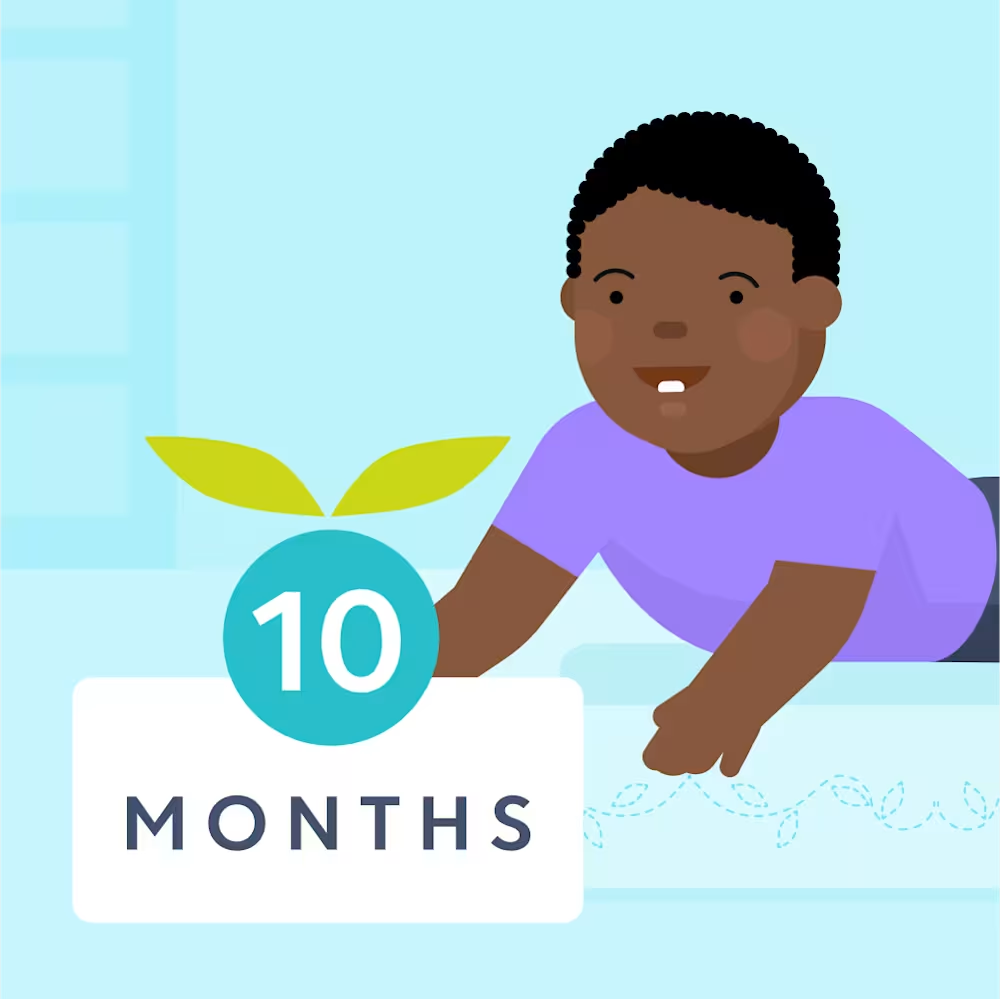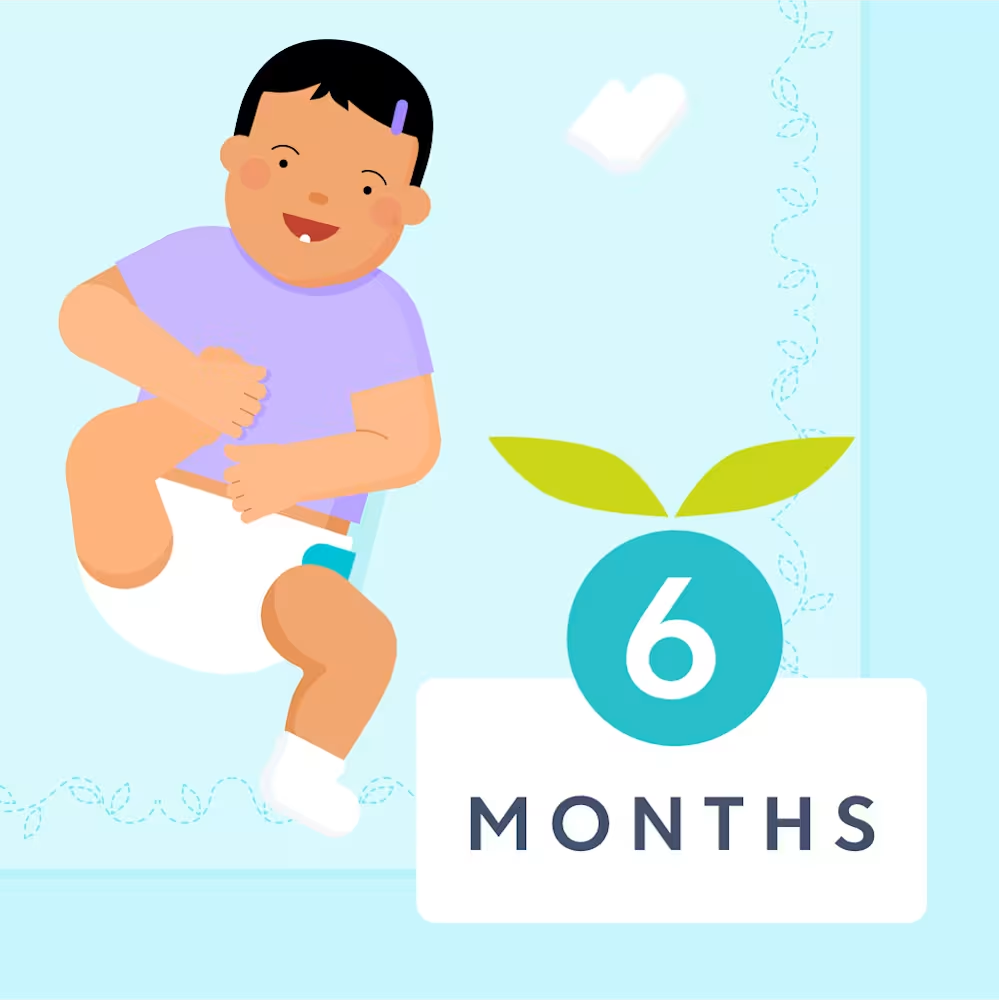8 month old sleep schedule: Bedtime and nap schedule
Updated Dec 15, 2025

Is your baby ready for a new 8 month sleep schedule? At this age, your baby is likely outgrowing the awake windows for a 3-nap schedule. This means they may transition to a 2-nap schedule around this time, if they haven’t already. Expect sleep to be a bit bumpy during these nap transitions as your baby adjusts to staying awake for longer periods.
Try not to worry — this is temporary! Overtiredness is sometimes inevitable during this period, and it’s common to see new or increased sleep difficulties at this age (often called the ”). Maintaining healthy sleep habits will help your baby move past any regressions as quickly as possible.
How much should an 8 month old sleep?
At 8 months, we’ll aim for about 14 hours of total sleep per day. That typically breaks down to 11 - 12 hours at night and 2 - 3 hours during the day over 2 - 3 naps. Most children need 2.25 - 3.5 hours of awake time in between sleep periods at this age.
However, also keep in mind that baby sleep needs aren't universal — there's a spectrum of what is considered normal and healthy. Don't let the hours get you down if your child isn't quite there. The recommended hours are just a general idea, and it's equally important to keep an eye your child's mood and energy levels to ensure they're getting enough shut-eye.
Here's a quick overview of what you may expect when it comes to 8 month olds and sleep. Note that these figures are averages and should be used as guidelines.
Top sleep tip for 8 month olds
Once that third nap is dropped, you’ll want to offer an earlier bedtime to limit the amount of overtiredness caused by the nap transition. Ensuring you have longer pre-sleep bedtime rituals [] will help cue your baby that it’s time for bed rather than the third nap.
Sample 8 month old sleep schedule

Note: Sleep needs vary by child, and this chart should be viewed as an example.
Morning rise: 7:00 AM
Wake window before first nap: 2.75 hours
First nap: 9:45 AM - 11:15 AM (1.5 hour nap)
Wake window before second nap: 3.25 hours
Second nap: 2:30 PM - 4:00 PM (1.5 hour nap)
Get ready for bed: 6:30 PM
Wake window before bedtime: 3.5 hours
Asleep: 7:30 PM
Naptime schedule for an 8 month old
How long should an 8 month old nap?
Aim for your 8 month old to get an average of about 3 hours of daytime sleep broken up into. Ideally, the first 2 naps of the day will each be at least 60 minutes long. If your baby is still taking 3 naps, that last catnap is usually a shorter 30- to 45-minute nap.
How many naps for an 8 month old?
Most 8 month olds take 2 - 3 naps per day. At this age, it’s common to have both 2-nap and 3-nap days if your baby is dropping a nap.
At this age, we expect babies to need a nap after 2.25 - 3.5 hours of awake time. If you’ve been offering naps based on, you can consider moving to a . This means naps and bedtime are at the same times each day, even if your baby wakes up a little earlier or later. Set schedules help regulate a baby’s circadian rhythm (internal body clock) and sleep pressure (the natural buildup of tiredness), making it easier for them to fall asleep and stay asleep. Many parents find it helpful to start this transition by setting a consistent time for the first nap of the day, which can help anchor the rest of the schedule and create more predictability.
3-nap schedule
2-nap schedule
Bedtime for an 8 month old
What time should an 8 month old go to bed?
At this age, plan for bedtime to be 2.75 - 3.5 hours after waking from the last nap. Babies taking 3 naps a day will have shorter awake windows, while babies taking 2 naps a day will have longer awake times. Plan for bedtime to be 12 - 14 hours after their morning wake-up time but no earlier than 6:00 PM.
Why does my 8 month old keep waking up at night crying?
If your baby's night waking has ramped up, it may be due to factors like , illness, or developmental milestones (like crawling). They also may be calling out for you if they’re used to receiving help falling asleep at bedtime (like rocking, patting, feeding) and want that same assistance when they wake up overnight. While it’s perfectly fine to help your little one to sleep, continuing sleep associations past the point where it’s developmentally necessary can lead to poor sleep for children and parents.
If you’re looking to make a change in the way your baby falls asleep, consider submitting for a personalized Sleep Plan via .
Is there a sleep regression at 8 months old?
Contrary to popular belief, there’s no magical date on the calendar that will send your baby’s sleep into a tailspin. Sleep regressions can happen at any age. However, it’s common for new sleep challenges to arise around 8 months due to factors like developmental milestones (like crawling), teething, illness, and travel.
Can my 8 month old sleep with a pacifier?
Sleeping with a pacifier at 8 months can soothe babies during sleep times (and awake times too). However, your baby may become distraught if their pacifier falls out of their mouth while sleeping and cry out for you to replace it. This may happen multiple times overnight! While infants may not have the hand-eye coordination to replace a pacifier on their own just yet, this is a great time to practice. Helping them hold it and move it slowly to their mouth during awake times can eventually teach them to do so themselves during sleep.
Keep in mind that the AAP doesn’t recommend forcing your baby to take a pacifier or using it to delay (or replace) feedings that are vital for growth and brain development [].
Can I sleep train an 8 month old?
Babies are typically developmentally ready for sleep training at . If you decide sleep training is right for your family, there are various to consider — some are more gradual and take a bit longer to see results and others prioritize speed and results. There’s not a one-size-fits-all approach, so it’s up to you to determine the best fit for your baby and parenting style.
Can an 8 month old sleep on their stomach or side?
At 8 months, the AAP recommends [] babies always be placed flat on their backs in their sleep space. If your baby can comfortably roll both ways (front to back and back to front), you can let them sleep on their stomach or side if they move into these positions while sleeping.
Should I swaddle my 8 month old?
At 8 months, swaddling is no longer recommended. Most babies are active rollers and developing important independent sleep skills at this age. Keeping them swaddled can interfere with learning how to self-soothe and fall asleep on their own, an essential step in preventing ongoing sleep struggles.
What are the developmental milestones for an 8 month old?
Here are some things your baby may try at 8 months, but don’t fret if they’re not there quite yet. There’s a range of normal for meeting developmental milestones and not all infants will reach them at the same time.
Rolls over in both directions
Sits without support and is practicing reaching while sitting
Crawls, scoots, and/or rocks back and forth on their hands and knees
May start to be able to pull themselves up to a standing position with support
May be able to pick objects up with forefinger and thumb due to developing pincer grasp
Moves objects or toys from one hand to another
Responds to their name
Uses a couple of sign language signs if they’re being used by caregivers
Babbles start to sound more like speech
Makes noises to get your attention
Eats a variety of solid foods
Looks for hidden objects or people that move out of sight
Starts to understand simple cause and effect and performs simple actions to make things happen
Does an 8 month old need to eat during the night?
Many babies at don’t require night feedings as they’re able to sleep for long stretches overnight. However, some infants sleep better and longer with an early morning feed (usually between 3:00 AM and 5:00 AM). If you have specific questions about feeding, reach out to your child’s pediatrician or a lactation consultant for advice.
Takeaway
We’ll aim for about 14 hours of total sleep per day at 8 months. That typically breaks down to 11 - 12 hours at night and 2 - 3 hours during the day over 2 - 3 naps. Most children need 2.25 - 3.5 hours of awake time in between sleep periods at this age.
Once that third nap is dropped, you’ll want to offer an earlier bedtime to limit the amount of overtiredness caused by the nap transition.
If you’ve been offering naps based on, you can consider moving to a . This means naps and bedtime are at the same times each day, even if your baby wakes up a little earlier or later.
If you're curious about what lies ahead in the coming month, glimpse into the future to see what you might experience once your baby is on a. Also look back at a to see how far your little one has come.
Share article:
Note: The content on this site is for informational purposes only and should not replace medical advice from your doctor, pediatrician, or medical professional. If you have questions or concerns, you should contact a medical professional.
4 Sources
Share article:







